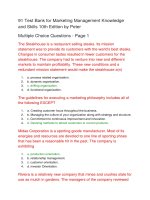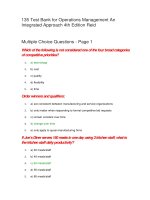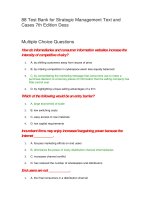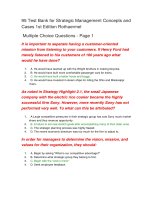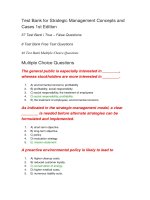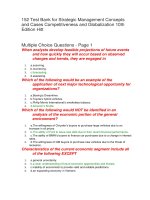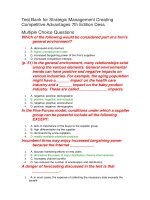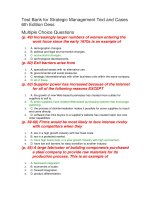Test bank for strategic management theory and practice 4th edition by parnell
Bạn đang xem bản rút gọn của tài liệu. Xem và tải ngay bản đầy đủ của tài liệu tại đây (292.95 KB, 12 trang )
/>
Test Bank For Strategic Management Theory
and Practice 4th Edition by Parnell
Chapter 1: Fundamentals of Strategic Management
Link download full: />
1.
The term strategy refers primarily to activities at the top level of the
organization.
*a. True
b. False
2.
Managers who are too busy to engage in strategic planning should wait until
they have more free time in their schedules.
a. True
*b. False
3.
According to the strategic management model, strategic control occurs
before strategy formulation.
a. True
*b. False
4.
An effective strategy is built on the foundation of the organization’s
comparative advantage, the mechanism whereby the organization seeks to earn a
profit by selling its goods.
/>
a. True
*b. False
5.
Identifying a firm’s business model is rarely difficult in general terms, but
can become more complex when intricate details are considered.
*a. True
b. False
6.
The gap between intended and realized strategies usually results from
middle management ineffectiveness.
a. True
*b. False
7.
Most strategic management scholars have endorsed an “artistic” perspective
on strategy formulation.
a. True
*b. False
8.
The industrial organization perspective on firm performance emphasizes the
fit between the firm and its environment.
a. True
*b. False
/>
9.
Resource-based theory primarily focuses on individual firms rather than the
competitive environment.
*a. True
b. False
10. A firm’s ability to enjoy strategic benefits over an extended period of time is
known as strategic positioning.
a. True
*b. False
11. The contingency theory perspective on firm performance emphasizes the
structure of the industry.
a. True
*b. False
12. Both industrial organization theory and resource-based theory are
incorporated into the case analysis process.
*a. True
b. False
13. Corporate governance refers to the board of directors, institutional investors,
and large shareholders known as blockholders who monitor firm strategies.
*a. True
b. False
/>
14.
Strategic decisions may be short-term or long-term in focus.
a. True
*b. False
15.
The chief executive is held responsible for the effects of strategic decisions.
*a. True
b. False
16.
The notion of strategy assumes
a.
that an organization has a plan.
b.
that an organization’s strategic managers understand the source of its
competitive advantage.
c.
that the organization’s members understand the reason for its existence.
*d.
All of the above.
17.
The notion of strategy assumes
a.
that experts in strategic planning are employed by the organization.
b.
that managers have time to develop formal strategic plans.
*c.
that the organizational already has a plan.
d.
All of the above.
18.
The concept of strategic management includes
/>
a.
top management’s analysis of the environment in which the organization
operate
b.
the plan for strategy execution
c.
strategic control efforts.
*d.
All of the above
19. Which of the following is not one of the steps in the strategic management
process?
a.
Execute the strategy
b.
Control the strategy as necessary
c.
Conduct an internal analysis
*d.
All of the above are steps in the strategic management process.
20. The mechanism whereby the organization seeks to earn a profit by selling its
goods is known as
a.
comparative advantage.
b.
competitive advantage.
*c.
the business model.
d.
none of the above
21. Which of the following is not a factor usually associated with an effective
strategy?
*a.
Top managers rely on outside strategic planners for creativity and analysis.
/>
b.
Plans for putting the strategy into action are designed with specificity before
it is implemented.
c.
Strategic managers understand how the organization’s resources translate
into strengths and weaknesses.
d.
Possible future changes in the proposed strategy are evaluated before the
strategy is adopted.
22. Which of the following is not a factor usually associated with an effective
strategy?
a.
The strategy is consistent with them mission and the goals of the
organization.
b.
Plans for putting the strategy into action are designed with specificity before
it is implemented.
c.
Strategic managers understand how the organization’s resources translate
into strengths and weaknesses.
*d.
All of the above are factors usually associated with an effective strategy.
23.
The strategy originally planned by management is known as the
a.
purposed strategy.
*b.
intended strategy.
c.
realized strategy.
d.
impact strategy.
24.
The strategy actually implemented by management is known as the
/>
a.
intended strategy.
b.
emergent strategy.
*c.
realized strategy.
d.
effective strategy.
25.
A gap between the intended and realized strategies
a.
rarely exists.
b.
exists only when management does a poor job of research.
c.
suggests middle management ineffectiveness.
*d.
None of the above.
26. Which strategic planning approach has been endorsed by most strategy
scholars?
a.
Conceptual perspective
b.
Artistic perspective
*c.
Scientific perspective
d.
None of the above.
27.
According to the scientific perspective of strategic planning,
a.
strategy formulation is not as critical as strategy execution.
*b. the business environment is seen as largely objective, analyzable, and at
least somewhat predictable.
c.
creativity is vital and can only be generated when flexibility is applied to the
strategy process.
/>
d.
All of the above.
28. Which of the following perspectives assumes that industry structure is the
primary influence on firm performance?
*a.
Industrial organization theory
b.
Resource-based theory
c.
Contingency theory
d.
None of the above
29. Which of the following perspectives assumes that the firm’s unique
combination of strategic resources is the primary influence on firm performance?
a.
Industrial organization theory
*b.
Resource-based theory
c.
Contingency theory
d.
None of the above
30. Which of the following perspectives may be viewed as a “middle ground”
between the other two?
a.
Industrial organization theory
b.
Resource-based theory
*c.
Contingency theory
d.
None of the above
/>
31. Which of the following distinctions is not associated with strategic decisionmaking?
a.
It represents a systematic, comprehensive analysis.
b.
It involves choices.
*c.
It is both short-term and long-term oriented.
d.
It is distinctively opportunistic.
32. Which of the following distinctions is not typically associated with strategic
decision-making?
a.
It represents a systematic, comprehensive analysis.
b.
It involves choices.
c.
It is long-term oriented.
*d.
It involves decisions made by the CEO, not the top management team.
33.
Strategic decisions are
a.
usually made by the top executive alone.
*b.
the responsibility of the top executive.
c.
generally subject to middle management approval.
d.
All of the above
34.
Top management teams
a.
tend to include fewer managers in centralized organizations.
b.
usually include mostly top level managers.
/>
c.
may include non-managers.
*d.
All of the above.
35.
Top management teams
a.
usually make better decisions as a group than the CEO could make alone.
b.
may include middle managers.
c.
may include members of the board of directors.
*d.
All of the above.
Type: E
36.Should steps in the strategic management process be completed sequentially?
a. The answer depends on one’s perspective. Outsiders analyzing a firm should
apply a systematic approach that progresses through these steps in order. Doing so
develops to a holistic understanding of the firm, its industry, and its strategic
challenges. In organizations, however, strategies are being formulated,
implemented, and controlled simultaneously while external and internal factors are
being assessed and reassessed. In addition, changes in one stage of the strategic
management process will inevitably affect other stages as well. After a planned
strategy is implemented, for example, it often requires modification as conditions
change. Hence, because these steps are so tightly intertwined, insiders treat all of
the steps as a single integrated, ongoing process.
Type: E
37.If intended strategies are often not realized, then why should top managers
invest time and energy into the strategic management process?
a. Answers should emphasize that although intended strategies are not always
realized, the gap between intended and realized strategies can be narrowed through
/>
effective planning. Strategic planning should not be ignored just because all
contingencies cannot be predicted accurately.
Type: E
38.Should strategic managers adopt a scientific perspective or an artistic
perspective on strategy? Explain.
a. There are two different perspectives on the approach that top executives should
take to strategic management. Most strategy scholars have endorsed a scientific
perspective, whereby strategic managers are encouraged to systematically assess
the firm’s external environment and evaluate the pros and cons of myriad
alternatives before formulating strategy. The business environment is seen as
largely objective, analyzable, and at least somewhat predictable. As such, strategic
managers should follow a systematic process of environmental, competitive, and
internal analysis, and build the organization’s strategy on this foundation.
According to the artistic perspective on strategy, the lack of environmental
predictability and the fast pace of change render elaborate strategy planning as
suspect at best. Instead, strategists should incorporate large doses of creativity and
intuition in order to design a comprehensive strategy for the firm. Henry
Mintzberg’s notion of a craftsman—encompassing individual skill, dedication, and
perfection through mastery of detail—embodies the artistic model. The strategy
artist senses the state of the organization, interprets its subtleties, and seeks to mold
its strategy like a potter molds clay. The artist visualizes the outcomes associated
with various alternatives and ultimately charts a course based on holistic thinking,
intuition, and imagination. “Strategy artists” may even view strategic planning
exercises as time poorly spent and may not be as likely as those in the science
school to make the effort necessary to maximize the value of a formal planning
process. The text and most scholars follow a scientific perspective, although this
does not mean that the artistic view is not relevant. Arguments will vary.
Type: E
/>
39.Which of the three major theoretical influences--industrial organization (IO)
theory, resource-based theory, and contingency theory--provides the most accurate
perspective on firm performance. Provide examples to support your answer.
a. Answers will vary. It should be noted that all three influences contribute to the
strategic management process.
Type: E
40.Who makes strategic decisions? Who is responsible for the outcomes?
Explain.
a. Answers should emphasize the fact that top executives rarely make strategic
decisions alone, but instead confer with other members of the top management
team. However, the top executive alone is responsible for the strategic decision.

